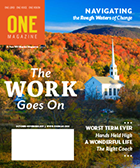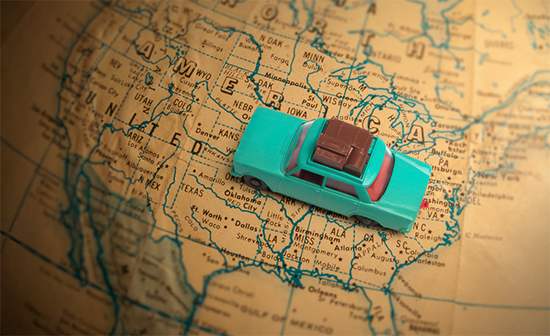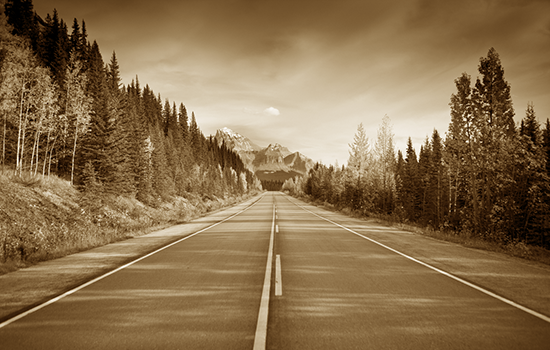
October-
November 2017
The Work Goes On
------------------
|






Couped Up
By Bill and Brenda Evans
It’s amazing what two people talk about when they’re confined in a 122-cubic-foot cell for 25 days. Forget that it’s a six-year-old, brown Buick. It’s still a tight little space. A vehicle and no bars, but after a few days, it feels like a cell. You are cooped up, the air is exponentially second-hand, and you can barely see through the bug-guts windshield.
We planned to be cooped up. Drive west and north from Kentucky through 12 states and four Canadian provinces in 25 days, and fly by the seat of our pants while doing it. That last idea was my husband Bill’s, by which he meant we would be free to be wherever we wanted to be, whenever we wanted to be there. No appointments, no hotel reservations, no GPS, just two stacks of Triple-A maps and free-range driving for 7,200 miles. “Great plan,” he said.
I thought it was hairy. I like to know where I’m going to sleep before I get there. I foresaw an unfavorable future: brown cuboid, on side of remote road, 200 miles from Podunk, no moon, no Wi-Fi, no bed, no bathroom, no sleep.
“I’m worried,” I whined.
“Just trust me,” Bill said, and flashed his biggest, toothiest grin. Bill has always wanted to be a pioneer. Flying by the seat of his pants would be close to pioneering. So we set out, cooped up with our maps in our cuboid on wheels. At first, we did all the predictable things in several of the Lower 48, then went up and over the international line into four Canadian provinces, and eventually down again into our own Lower 48 to see more things.
We also talked. Sometimes, profound generalizations, like South Dakota’s bugs are bigger than Wyoming’s and Montana’s because they make gimongus blood-and-gut splatters on our windshield. Fresh or dried, British Columbia’s honey crisp apples are worth every dollar. Ice cream is one of man’s premier inventions.
Other times, our jaws dropped in silence: a glistening red Kokanee salmon flailing upstream in an icy British Columbia river to drop her eggs and die; an eerie valley of stony Inukshuks pointing the way past dinosaur bones; the glassy water of Lake Moraine shimmering like blue fire.
Eventually, we ate our words. Claiming to be bad tourists who didn’t fall for ads touting three-headed grizzlies and five-pound gems, we became utterly vulnerable to words. In the middle of somewhere, a red casino sign blazed: CHEAP FOOD. We were hungry. It was way past noon. Breakfast had been dry and hard. The next town was 60 miles west. We could die before we got there. So we walked into the casino’s garish clamor of sounds and lights, past silent old women pulling handles and black-suited men whirling roulette wheels, and sat down to eat.
Back in the car, I said, “Why did we do that?”
“We were hankering,” Bill said. So, cooped up in our Buick, hankering, whether spoken or unspoken, became an operative word for us. Ice cream, for example. Our brown Buick made Bill hanker for the creamy chocolate stuff. One day we sped along chanting in 4/4 time: I want—I need—ice cream. Clap. Clap. (Repeat and repeat.) Wilson’s on Wisconsin’s Door Peninsula was superb; 1,000 calories per scoop, no doubt, but superb. I had caramel something or other. Bill had chocolate. A few days later, near the border of Manitoba and Saskatchewan, we spied flashy words on a petrol convenience store—f’real™ milkshakes—and bought in. Despite ads for authentic milkshakes and real ingredients, f’real™ was bad.

“Suckered, weren’t we?” Bill said and slurped out his last blob of chocolate. “Yeah, hankerings again,” I mumbled and spooned something cold and faux pink down my gullet. We mused about hankerings and wants and needs as we rambled on toward Al Capone’s Tunnels and a well-advertised fudge store in Moose Jaw, Saskatchewan.
“I want is a powerful phrase,” Bill said.
“Yeah, blurs into I need when we actually don’t need it,” I added. Bill pressed the gas pedal harder and set the cruise control while I googled Bible passages on greed and gluttony.
“We should try harder,” he urged, as the Buick evened out at 75.
In Moose Jaw, with 20 other tourists, we followed the leader, an actor who took us into the tunnels and let us in on Capone’s Canadian bootlegging life during the U.S Prohibition. Five or six other actors joined him, and we were entertained, which we’d had a hankering for after being cooped up so long. Afterwards, at Chocolate Moose Fudge Factory, half a dozen flies buzzed and settled on the chocolate and maple and peanut butter fudge, so we grudgingly abstained, climbed back in our brown cuboid, and headed west to Alberta.
“I really, really wanted maple fudge,” I grumbled. “Canadians know their maple. Just look at their flag.”
“Yeah, but the flies beat us to it. We should’ve stuck with ice cream,” Bill said.
And so we did at Banff, where the Canadian Rockies were beyond spectacular, and the ice cream was good. We licked and slurped and watched magpies swoop around us, squealing that we should share. In black and white feathers and iridescent swaths of blue, they flicked past, collecting crumbs, trinkets, or whatever caught their eyes. They acted familiar, like gluttonous, stingy little gatherers. If it’s edible, gulp it. If it’s not, secrete it in your stash.
At Peachland, British Columbia, in the fruit and wine Okanagan Valley, we decided to forego peaches and buy ice cream. The real stuff again, licked off the cone in the sunshine at a picnic table by Lake Okanagan. The lake, the breeze, the ice cream were loverly, we said, a word we pull out only when something is extra-special good.
Several days later, we showed our passports again, slipped back into the Lower 48 at the northern tip of Idaho and drove on to Montana and Wyoming for more big sites in nature and history. Later at little Sundance, Wyoming, we found ice cream. I noshed on huckleberry. Bill had more chocolate, this time with walnuts. We photographed the tiny jail because in 1887 Harry Alonzo Longabaugh hankered for a gun, horse, and saddle, stole them, and landed there. While there, he decided to become Sundance Kid. Later, he took up with Butch Cassidy.
Free donuts and coffee for newlyweds was one of dozens of colorful signs we began to see after Little Big Horn. A hundred miles later, we turned in at Wall Drug in western South Dakota and became paying customers. Bill bolted right past ice cream—straight to John Wayne. Cowboys snag him every time. He held up a burnt orange tee shirt with “Old Men Rule” blazed on the front and John Wayne’s face all over the back. “Forget pioneer. You look like a cowboy to me,” I said. He bought it.
Despite John Wayne on his back, Bill did not give up his yen to pioneer. At Rushmore, under the granite gaze of four dead presidents, he bought a book titled Pioneer Women and handed it to me. “Hankerings die hard,” I said.
“Every pioneer man needs a pioneer woman,” he whispered and winked at me. We were near the end. We had begun our 25-day meanderings on Wisconsin’s Door Peninsula. Beautiful and historical, the peninsula juts 80 miles north into Lake Michigan. We had read about its quaint villages and rocky beaches, about Wilson’s ice cream and a Swedish restaurant where goats graze on the grass roof and servers pass you lingonberry jam, about a famous water passageway at the northern tip called Death’s Door. We hankered to go, so we did.
Our last “official” stop was at mako sica, as Lakota tribal people call it, the Badlands of South Dakota. Cooped up and weary, we arrived late that morning, mentioned the irony of Death’s Door at the beginning and Badlands at the end, unfolded from our Buick cell, and let Badlands draw us in.
A thousand eroded sawtooth steeps and cliffs rose from sienna plains, harsh and beguiling in muted reds, browns, and yellows. God-made ledges and sterile shelves slanted down into bleak flats and spread away from us farther than we could see. We bathed in mako sica’s stillness, its barrenness. Bill spied movement. Through binoculars, he spotted a cluster of bighorn sheep in a dry wash, eking out dry grasses and sedges just to live. Mothers with lambs nibbled and watched, guardedly sating their hunger. A ram rested nearby.
A few hours later, we climbed into our brown cuboid and headed east, as filled and at ease as the resting bighorn. All hankering was gone, except one—home!
About the writers: Bill and Brenda Evans live in Ashland, Kentucky. Bill is former director of the Free Will Baptist Foundation, and Brenda is a retired English teacher. Visit www.fwbgifts.org for more information on planned giving that benefits your favorite ministry.
|
|

